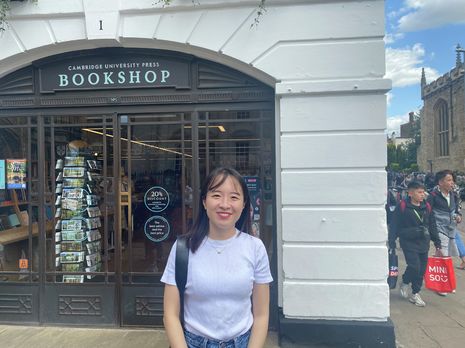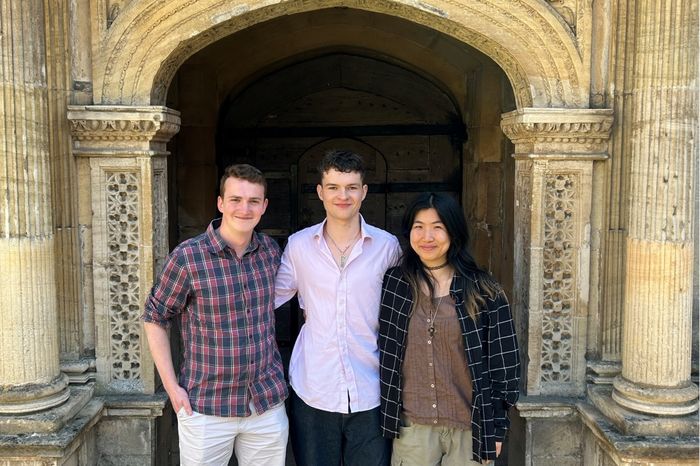Meet Miyuki Watanabe: Japanese diplomat and Cambridge student
Vienna Kwan sits down with Miyuki Watanabe, a Cambridge student and Japanese diplomat

Not often can you call a Japanese diplomat a fellow student, but Miyuki Watanable is precisely that. Having completed her undergraduate degree in Japan and her first postgraduate degree at LSE, Watanabe has just completed her MPhil in South Korean studies with the Asian and Middle Eastern Studies (AMES) faculty here in Cambridge. I met with her in the newly opened Shake Shack.
Where were you before Cambridge?
Before this, I studied international relations at LSE. So for my second year in the UK, I just wanted to focus on the regional studies of South Korea. I wanted to change my environment, so that’s why I chose Cambridge.
What is your dissertation on?
I’m still working on it! It’s a comparative study about South Korean foreign policy for Japan under the past two administrations (Kim Dae-jung and Roh Moo-hyun).
“the only Japanese (and also the only Asian) in the class to be asked for my opinion”
Can you tell me more about your faculty?
I’m with the faculty of Asian and Middle Eastern studies – a really small, but lovely and cozy community. I’ve had a chance to meet many people who are working in academia and are trying to become a scholar in the future, so I think I will continue to have good relationships with the people I’ve met here while I’m working as a diplomat.
What was your undergraduate degree in Japan?
My undergrad was in the faculty of law, but I was focusing on political science and international relations at Keio University in Tokyo.
Have you ever lived anywhere else?
Okay, so I’ve never lived in English-speaking countries before this. When I was an undergrad, I studied in Paris for one year as an exchange student, and I did politics there as well in Sciences Po. That was my first time living abroad, so it was a truly valuable experience for me. It was very demanding because all the classes were conducted in French, but the experience of being the only Japanese (and also the only Asian) in the class to be asked for my opinion was a major catalyst in getting me interested in my current job.
“The difference in soft power [...] is not about superiority or inferiority, but about how to disseminate those things to the world”
Did you go straight from your undergraduate to your postgraduate degree, or did you have work experience before this?
I had work experience for two years as training in Japan before coming to the UK. Next week, I’ll be heading to Australia, and that will be my first posting as an official diplomat. When I was in Japan, my responsibilities were supporting the negotiations with maritime Southeast Asian countries, such as Singapore, Indonesia and the Philippines, and logistics such as preparing for the state visits of the Japanese Prime Minister or the Japanese Foreign Minister.
What is your upcoming job title in Australia?
I will be working as Second Secretary. I have to focus on strengthening the bilateral relationship between Australia and Japan, but at the same time Australia is also dealt with within a multilateral framework. I believe both Japan and Australia play an important role in protecting peace and stability in the region.
With Japan’s soft power growing more and more everyday, how is this viewed through a diplomat’s lens?
In my personal opinion, J-pop was pretty big, but now K-pop is also well-known, and the South Korean Government is fully making use of these artists. In November 2023, when Presiden Yoon visited the UK as a state guest, Blackpink was also awarded an MBE (Honorary Members of the Order of the British Empire). But, I believe that the difference in soft power between Japan and South Korea, especially in the music industry, is not about superiority or inferiority, but about how to disseminate those things to the world.

Meet the three Caians chairing CUCA, CULA and CULC
In Sun Tzu’s Art of War, there is a phrase: “If you know the enemy and know yourself, you need not fear the result of a hundred battles.” This citation is just a metaphor, and I do not think South Korea is Japan’s enemy at all. But I believe that it is essential to know the other countries – especially the neighboring countries that are important to Japan – in order to further improve bilateral relations. This is one of the reasons why I chose this department at Cambridge.
What was your biggest culture shock when you arrived in the UK?
The toilets haha.
Our interview comes to a close as I urge Watanabe to use her diplomatic powers to install Japanese toilets everywhere in the world. Watanabe is a fascinating reminder of the extraordinary talent in Cambridge. Who knows: the person you walked past in Market Square could one day change the world.
All opinions expressed in this interview are Watanabe’s personal opinions, and not representative of the Japanese Foreign Ministry.
 News / Colleges charge different rents for the same Castle Street accommodation2 March 2026
News / Colleges charge different rents for the same Castle Street accommodation2 March 2026 News / King’s hosts open iftar for Ramadan3 March 2026
News / King’s hosts open iftar for Ramadan3 March 2026 Theatre / Lunatics and leisure centres 4 March 2026
Theatre / Lunatics and leisure centres 4 March 2026 News / Angela Merkel among Cambridge honorary degree nominees27 February 2026
News / Angela Merkel among Cambridge honorary degree nominees27 February 2026 News / News in Brief: waterworks, wine woes, and workplace wins 1 March 2026
News / News in Brief: waterworks, wine woes, and workplace wins 1 March 2026







